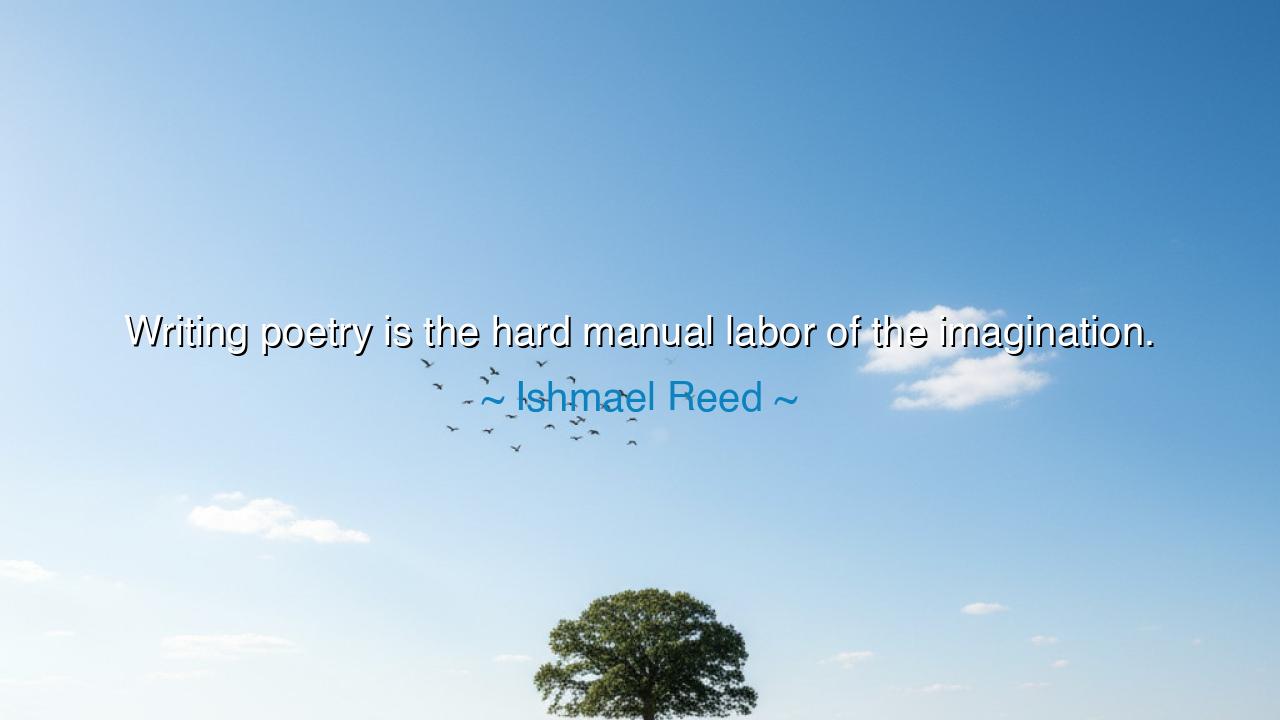
Writing poetry is the hard manual labor of the imagination.






“Writing poetry is the hard manual labor of the imagination.” – Ishmael Reed
In this mighty and humbling declaration, Ishmael Reed, the great poet and craftsman of words, speaks not of idle musings or gentle inspiration, but of toil — the sacred, strenuous labor of bringing forth beauty from the unseen world. His words strike like a hammer upon the anvil of truth: poetry is not merely a dream, but the disciplined forging of imagination into form. The poet, in Reed’s vision, is not a delicate dreamer drifting through visions, but a worker — a builder of meaning, a miner of emotion, a sculptor of silence. And this work, though invisible to most, demands the same endurance and sweat as any physical craft.
When Reed speaks of manual labor, he reminds us that creation, though born in spirit, must be shaped through effort. The mind may conceive wonders, but it is through the poet’s hands — through ink, through rhythm, through sleepless nights — that those wonders take form. To write a single line of truth is to wrestle with the infinite; to build a poem is to hew marble from the air. Imagination alone is not enough — it must be disciplined, harnessed, guided by the strength of will. In this, the poet’s forge burns as hot as any blacksmith’s fire. Each word, each image, each pause is a strike of the hammer, shaping what was once formless into something eternal.
In the ancients’ time, the poet was called a seer, one who could draw down the unseen and give it voice. Yet even they knew that divine vision alone was not sufficient — the oracle must learn the language of men. So too does Reed call us to remember that imagination is a raw material, like ore beneath the mountain, and only through labor can it become art. The poet must dig deep into the mind’s dark mines, bringing to light what others fear to see. This work is not gentle. It demands courage, patience, and the unrelenting will to shape chaos into order.
Consider the life of William Blake, who spent his days engraving copper plates to earn a living, while his nights were filled with visions of angels and burning cities. His poetry — fierce, mystical, divine — did not spring effortlessly from his dreams. It was born of struggle, carved word by word from the hard stone of existence. Blake understood, as Reed does, that imagination must be labored into being. His hands were stained with ink and metal dust; his eyes, weary from long nights of work. Yet through this marriage of vision and labor, he created a body of work that would ignite the minds of generations. He proved that the imagination, when disciplined by effort, becomes divine craftsmanship.
There is also power in Reed’s defiance — for he stands against the notion that poetry is a luxury, a pastime of leisure. To him, it is work, sacred and strenuous, rooted in the dignity of creation itself. The poet is no different from the farmer who tills the soil, from the mason who raises a wall, from the musician who wears calluses on his fingers. Each is engaged in the holy act of making something from nothing. In calling it manual labor, Reed restores poetry to its rightful place — not as escape, but as engagement; not as softness, but as strength.
To those who seek to create, this truth must be embraced: there is no art without effort, no vision without sweat. Inspiration may arrive like a spark, but it is labor that sustains the flame. The poet must return to the page each day, hands ready, heart steady, chiseling meaning from the vast quarry of thought. As the body grows through exercise, so too does the imagination through discipline. To labor in this way is not to diminish creativity, but to sanctify it — to make of one’s work a form of worship.
And so, children of the word, take this teaching to heart: honor the labor of your imagination. Do not wait for ease, nor despair when creation feels heavy. To write, to dream, to build — these are acts of courage. Sweat for your art. Bleed for your ideas. Let your hands and your heart move as one, shaping the invisible into form. For when you labor with devotion, the imagination will reward you with worlds untold.
Thus Ishmael Reed’s wisdom endures: writing poetry is labor, but it is the noblest labor of all — the kind that builds bridges between heaven and earth, between thought and eternity. Work well in your inner fields, and your imagination will bear fruit that nourishes generations.






AAdministratorAdministrator
Welcome, honored guests. Please leave a comment, we will respond soon